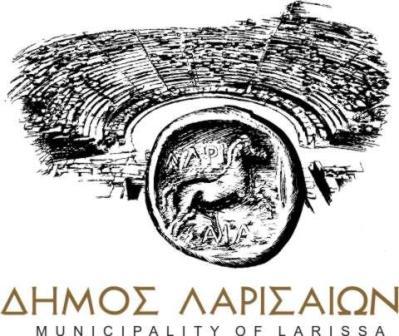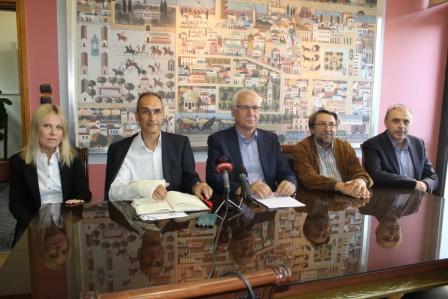During a joint press conference, the Mayor of Larissa, Apostolos Kaloyiannis, and the General Director of Greenpeace Greece, Nikos Charalambides, inaugurated the collaboration for a pioneering photovoltaic project to be used to promote social policy.


A project will start immediately in Larissa, aspiring to be a model of how solar power can be utilised at a large scale by other municipalities as well, to reduce their energy costs, free them from dependence on polluting fossil fuels and allow them to exercise a more effective social policy. The Municipality of Larissa will install a number of photovoltaic systems with a capacity of at least 200kW[1] on the roofs of municipal buildings, with Greenpeace symbolically donating the first of these systems, with a capacity of 15kW.[2] The energy produced will be subject to the existing legal framework on virtual net metering and will be credited to electricity meters of the social structures of the Municipality that do not have suitable roofs for the installation of photovoltaic systems.
“The Municipality of Larissa has decided to collaborate with Greenpeace, to promote solar power as a means of exercising social policy, through the net-metering program. It is undoubtedly a significant cooperation, with unique prospects. By signing the cooperation protocol with Greenpeace, the Municipality of Larissa shows its determination to use the potential of renewable energy sources - solar energy in particular - with a view to save resources and to exercise social policy. In the context of this cooperation, in the coming months, the Municipality of Larissa will install a number of photovoltaic systems with a capacity of at least 200kW on municipal buildings. As a first step, the energy produced will be offset with the energy costs of the municipal infrastructure, while the completion of the legislative framework for energy communities will pave the way for supporting vulnerable households in our Municipality, by crediting the electricity produced on their electricity meters. We are convinced that this cooperation will also be an inspiration and a guide for other Municipalities across the country”, said the Mayor of Larissa, Apostolos Kaloyiannis.
The cost for the purchase and installation of the first photovoltaic system, with a capacity of 15 kW, will be fully covered by Greenpeace and will be installed on the roof of the 4th High School - Senior High School of Larissa. The energy generated by the system will cover the energy needs of the Municipality's social structures - located in a different part of the city - namely the municipal structures housed in the “Rodopouleio” building, in the Averof area.
“By this initiative and commitment, the Municipality of Larissa is rightfully included in the international elite of cities that not only take specific actions to address climate change but, at the same time, ensure the cohesion of the social fabric. The production of clean energy with parallel, clear and measurable social benefits constitutes a legacy for the city and an example to be followed, both in Greece and around the world”, said the Director of Greenpeace Greece, Nikos Charalambides. “For Greenpeace in specific, today is a day of reward for the efforts of over twenty years in the promotion of clean energy as one of the key tools for addressing climate change. The path we paved with the Municipality of Thessaloniki now broadens and enters a new era with this initiative of the Municipality of Larissa”, added Nikos Charalambides.
In the context of their joint collaboration, Greenpeace and the Municipality of Larissa will also organize a series of training seminars on the benefits of solar energy in Greece. Moreover, when the improvements - currently under development - to the existing framework of virtual net metering[3] are completed, the Municipality of Larissa and Greenpeace will examine the option of crediting the energy generated by photovoltaic systems directly to electricity meters of vulnerable households in the Municipality, thus inaugurating a new age in practising social policy in our country. The use of free solar energy to meet energy needs in vulnerable households is an innovative and more effective way of addressing energy poverty and its implementation has already started abroad.[4]
|
How does virtual net metering work? Under L. 4414/2016, virtual net metering allows the production and injection of energy from photovoltaic systems to a point in the network and its offsetting against a consumption meter located at a different point in the network. Therefore, Municipalities can use the roofs of school buildings, that do not have high energy consumption (compared to the available solar capacity of their roof) and produce solar power credited in favour of other municipal buildings, that have high energy consumption (e.g. the city hall, accommodation structures, surgeries and clinics, social groceries etc.). This practice will result in significant savings for the Municipalities, in terms of the amounts spent to this day to cover the electricity bills of these structures. |
For further information:
Municipality of Larissa, Aris Psychos, 6970981913
Greenpeace, Takis Grigoriou, 6984617027
Footnotes for editors
[1] The indicative output of a 200kW photovoltaic system is about 280,000 kWh per year (power equivalent to the annual consumption of approximately 75 households). The photovoltaic systems will be installed on available municipal roofs or sheds and will generate energy that will be “virtually” offset by municipal electricity meters of social services of the Municipality, located in other buildings.
[2] Greenpeace will install, using its own funds, a 15kW system on the roof of the 4th High School - Senior High School of Larissa. This small system will produce approximately 21,000 kWh per year and will cover most of the electricity needs of the social structures housed in “Rodopouleio”. This is the second action of Greenpeace, which has already installed a pilot 10kW photovoltaic system at a school of the Municipality of Thessaloniki. The photovoltaic system of Thessaloniki will be the first in Greece to use virtual net metering and the power generated will cover the needs of the Shelter for Minors and Women - Victims of Domestic Violence of the Municipality of Thessaloniki. The collaboration between the Municipality of Larissa and Greenpeace aspires to promote solar social policy to the next level, investing in larger projects but also creating a model project for other Municipalities.
[3] The existing framework on virtual net metering does not allow Municipalities to virtually offset the energy generated by municipal photovoltaic systems against third parties’ meters (e.g. households). However, this is expected to change with the upcoming law on energy communities, which will allow - at initiative of the Municipality - the creation of a photovoltaic park and the allocation of energy to vulnerable households of the local community, in order to combat energy poverty.
[4] Specifically, it is currently implemented in progressive states of the USA, while a similar programme was recently announced in the United Kingdom.








